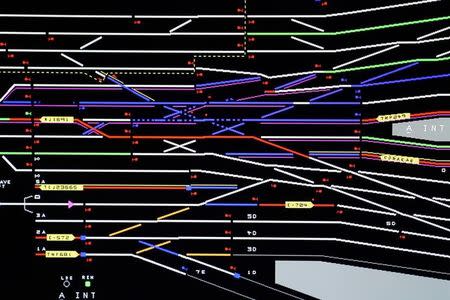U.S. safety board says train crash engineers had undiagnosed sleep disorder
By David Shepardson WASHINGTON (Reuters) - The engineers in two New York City area commuter train crashes suffered from sleep apnea that had not been diagnosed, the U.S. National Transportation Safety Board said on Thursday. The NTSB released factual findings on Thursday regarding its investigations into the crashes and said it planned to hold a meeting next February about both incidents and safety recommendations. A New Jersey Transit train crashed in Hoboken, New Jersey, in September 2016, killing one person and injuring more than 100. In January, a Long Island Rail Road train crashed, injuring more than 100 people. The NTSB said the brakes were working on the New Jersey Transit train that was traveling at 8 miles (13 km) per hour 38 seconds before the crash. The train then accelerated and was moving at 20 mph at impact, twice the speed limit. The 48-year-old New Jersey Transit engineer underwent a home sleep study in October 2016 that concluded he had severe sleep apnea, the NTSB said. The agency also said the engineer was obese and had gained more than 90 pounds in the five years before the crash. There was no record of any sleep apnea test being conducted in July 2016 as required by the transit agency, the NTSB said. According to the Centers for Disease Control being overweight puts individuals at a higher risk of sleep apnea. In January, the NTSB said the Long Island Rail Road train that crashed into a bumper at the Atlantic Terminal in New York City's borough of Brooklyn appeared to have been traveling at more than twice the speed limit of 5 mph. The engineer was diagnosed with severe obstructive sleep apnea after the crash, the NTSB said on Thursday. The LIRR began testing all of its 432 engineers for sleep apnea after the accident and told the NTSB that 34 had been screened through May. Eight of the 34 had were positive for sleep apnea and were referred for more testing. One other engineer told the LIRR he was being treated for sleep apnea. In both cases, the engineers had no memory of the crashes. Sleep apnea, often undiagnosed, is characterized by shallow or interrupted breathing during sleep and can leave sufferers fatigued, according to the U.S. National Institutes of Health. The Obama administration had been considering requiring truck drivers and railroad engineers to be screened for sleep apnea, but the Trump administration scrapped the effort last month. U.S. Senator Cory Booker, a Democrat from New Jersey, said in a statement, "These revelations underscore just how shortsighted and reckless the Trump Administration’s recent decision was to roll back common sense steps." Representative Bill Pascrell, also a New Jersey Democrat, called the government's decision to not pursue screening for railroad engineers "shameful." The NTSB has called for stricter screening of drivers and engineers for sleep apnea. In 2014, the NTSB said the driver of a train that derailed in New York City the previous year had an undiagnosed sleep disorder. Four passengers were killed in that accident. (Reporting by David Shepardson)


